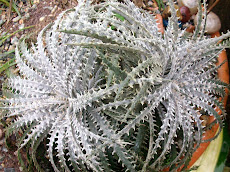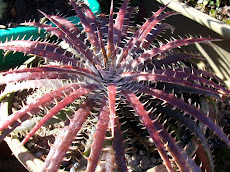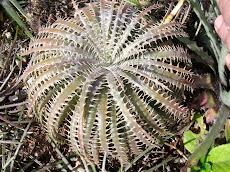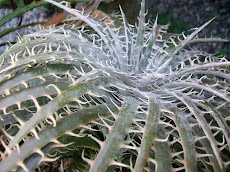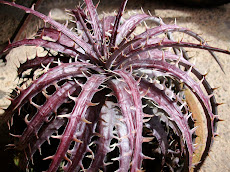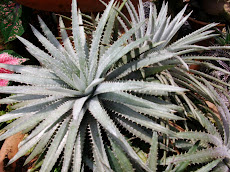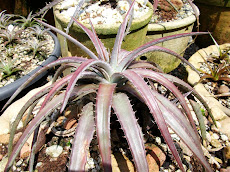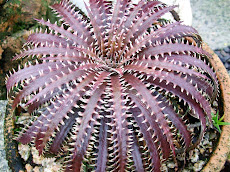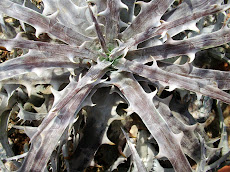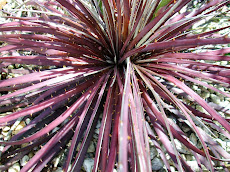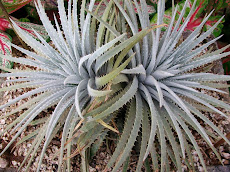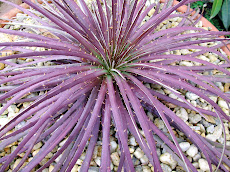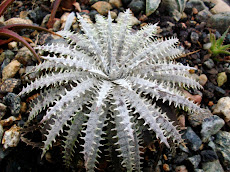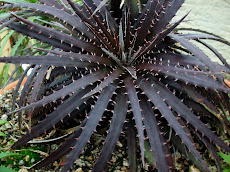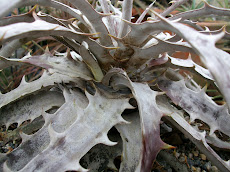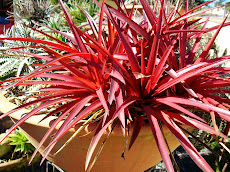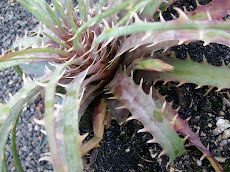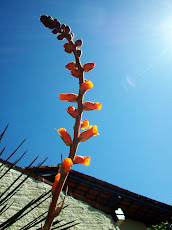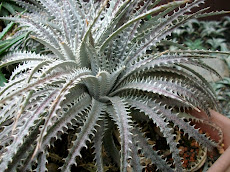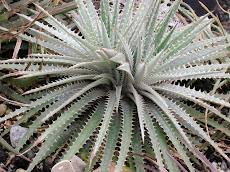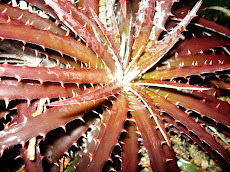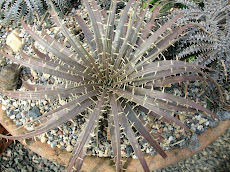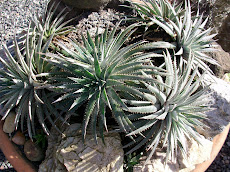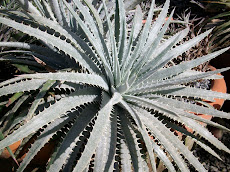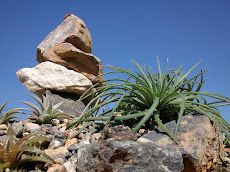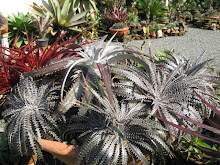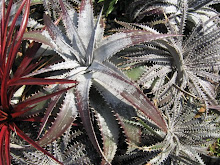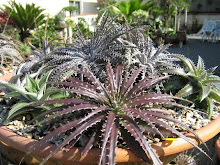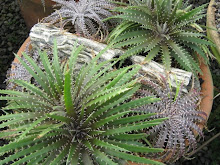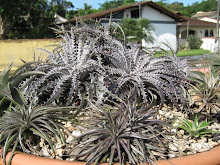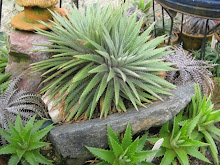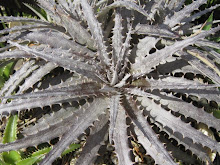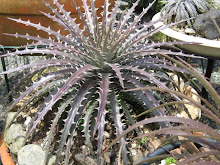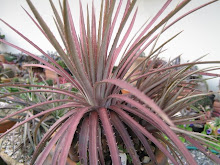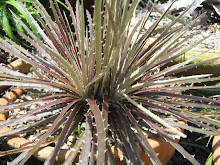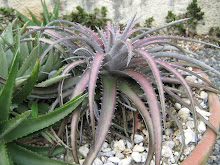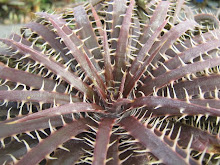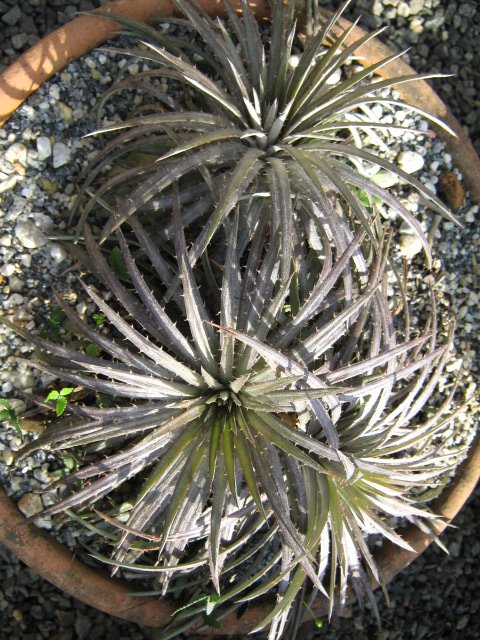Dyckia delicata red form
Perau do Tomba Bodes - Rio Grande do SulMar 31, 2010
Dyckia delicata cyanophylla
Dyckia delicata cyanophylla
A new show plant and one of the most beautiful Dyckia species.
Barros Cassal - RS
A new show plant and one of the most beautiful Dyckia species.
Barros Cassal - RS
Dyckia delicata
Dyckia delicata cyanophylla and the colorful red pinkish form from the
Tomba Bodes Slope.
Stunning!
New!
Spectacular!
Dyckias will surprise us more and more.....
Tomba Bodes Slope.
Stunning!
New!
Spectacular!
Dyckias will surprise us more and more.....
Dyckia species from Pedra Furada in Santa Catarina
This small and beautiful Dyckia species was found near Pedra Furada in Santa Catarina.
This little plant grows on rocks and its is very difficult to get close to them ´cause thy live
in a very mountainous area full of deep valleys.
We have also seen some populations Dyckia reitzii there.
The type form of Dyckia reitzii was found close by in Serra do Corvo Branco.
All this area is very cold in some winter days and the snow is not uncommon.
Dyckia fosteriana
There are many forms and varieties of this beautiful South Brazil Plant. Some of them are absolutely strinking plants. This ia a very old known plant but abroad it seems they all come from a single population of fosteriana most probably from where the type form came from.
Dyckia fosteriana is found only in Parana but it has a very wide range in there and it goens from North to almost South and to East close to the sea.
The whitest and most striking regional varieties are found from Lapa region ( Dyckia fosteriana nivosa form) to up North in Paraná till the border with São Paulo State.
Dyckia fosterian is a rock dweller and it may be found on many of the North faced rocky slopes in this region.
From one occurency to the other this wonderful plant changes a bit of its looking.
Some are almost white.
During heavy rain periods all plants are bald and most of them are red wine with a very few and extremely rare green ones scattered here and there.
There are many forms and varieties of this beautiful South Brazil Plant. Some of them are absolutely strinking plants. This ia a very old known plant but abroad it seems they all come from a single population of fosteriana most probably from where the type form came from.
Dyckia fosteriana is found only in Parana but it has a very wide range in there and it goens from North to almost South and to East close to the sea.
The whitest and most striking regional varieties are found from Lapa region ( Dyckia fosteriana nivosa form) to up North in Paraná till the border with São Paulo State.
Dyckia fosterian is a rock dweller and it may be found on many of the North faced rocky slopes in this region.
From one occurency to the other this wonderful plant changes a bit of its looking.
Some are almost white.
During heavy rain periods all plants are bald and most of them are red wine with a very few and extremely rare green ones scattered here and there.
Dyckia insignis a Paraguayan species
Dyckia insignis bear peculiar flowers. Big and just a few they do not get self fertilized.
The feminine part is the one that is spilled out of the flowers and it resembles a tiny bunch of grapes.
Produces much yellow coarse pollen that is useless to self polination.
The flower petals open only after being dry and death.
This plant produces fantastic hybrids.
Dyckia golden glow...a true show plant
If the plant is out of the tropics you may not only provide heating during most of the year but also good artificial light. For keeping tropical in subtropical climates one must have in mind the cost of the energy. Energy is not cheap and a Dyckia is not happy just with heating only. A Dyckia needs light, strong good light for at least 12 hours a day. The required lamps are costy and consume a lot of energy. If you save energy with Dyckias....hummmm it won´t work!
Some special lamps also produces heat. If the plant is kept on the edge of freezing it will never show off its beauty.
We have no White Bear in Rio de Janeiro. Polar bears are better seeing on TV hunting the poor leopard seal. TVs seta are fantastic today. For keeping a Polar bear in a Zoo anywhere in the globe this must be well equiped.
I do not even think of keeping a crocus or a dafodil or a tulip here in Joinville. Our Sun and our heat would fry them all on the very first hour of the very first Summer day.
Happy looking Dyckias are the result of well kept ones.
You may keep Dyckias even in Antartica but it would be such a waste of energy one would never wonder.
We can keep a group of a White bears in Manaus right in the heart of the Amazon jungle where The Negro and The Amazon Rivers meet. It would require a lot of special devices and many lots of money plus an absolutely crazy mind...plus a breeding program of those fatty and juicy leopard seals.
Dyckia goehringii when ...nothing compares to it.
Dyckia goehringii
...when dazzling exceeds itself in many folds...
This plant enjoys a drier condition but even so do not ever allow the substrate to get torrid dry.
The plant loves the umidity of the air and benefits greatly from a hight umidity content atmosphere.
In nature this beauty is hardly as stunning as this one here. It liveson the rocks and suffers seasonally from a five months of drought every year. Here in South and specially in Joinville our atmosphere is always sturated to almost the most possible and 99% is a common place.
It rains a lot year around and the Anthurium, the Croton, The Phylodendrum, the Alocasia they all love to live here and we have some very special native anthuriuns too.
This plant seems to enjoy the treatment it is getting and the high umidity saturated air.
Of coursely I do not let it under any rain.
The plant gets rain water but never on its leaves.
Rain water is fantastic as its contents in vital elements is very high.
No other water is comparable to the falling rain water.
Dyckia marnier-lapostollei var. estevesii
Dyckia marnier-lapostollei has many regional varieties the estevesii is just one of them.
The flowers of this variety do not open and the masculine parts are spitted out of the closed flower
from a very smal hole amid the tip of the petals.
This is a young plant , in time the spines get bigger and farer apart from each other.
Dyckia species from Lagoão region in Rio Grande do Sul
Thisd recent ly found Dyckias guards some similatrity to Dyckia delicata but even its spines are all very hard. Its habitat is not that far from the dlicata ones if we consider a straight line.
This is something to be observed and better studied.
This is something to be observed and better studied.
Mar 30, 2010
Dyckia lindelvaldeae
Dyckia lindelvadeae is the heaviest scale coated Dyckia.
A so deeply coated plant indicates the need for a drier condition of cultivation.
These scales allows the plant to collect water from the air and from dew formation
so hold heavy waterings.
Avoid any heavy rain and never hose this plant.
This is a luxury plant.
A so deeply coated plant indicates the need for a drier condition of cultivation.
These scales allows the plant to collect water from the air and from dew formation
so hold heavy waterings.
Avoid any heavy rain and never hose this plant.
This is a luxury plant.
The wonderful red colored Dyckia delicata from The Tomba Bodes Slope in Barros Cassal - RS
Dyckia delicata
This red form is found close to the mountain where Dyckia delicata type form was taken.
Some Dyckia species present very noticiable differences among a certain population. These red delictas do no grow amid the delicata type population but on a slope of another mountain close to
the one that guards and sustain the type delicata population.
This grows on a very acentuated aclive an almost vertical slope known as Tomba Bodes (Tips goats).
Dyckia pectinata one of the rarest of all Brazilian Dyckias.
Dyckia pectinata is one of the rarest Brazilian species
Here blooming by the very first time.
It will be two flower stalks at one time.
This plant never or just in extremely rare occasions pups or clones.
The onlyu way to get new plants is by seed.
Also most plants are self unfertile.
This plant is set to be rare.
Dyckia fosteriana X Dyckia fosteriana
Not a hybrid in strict sense but two fosteriana plants from differents locals
in nature were together to present this small gem.
Absolutely green fosterianas are extremely rare.
The great majority of the fosterianas shows some hint of redness.
this here is a very young plant and there is much to ahead.
in nature were together to present this small gem.
Absolutely green fosterianas are extremely rare.
The great majority of the fosterianas shows some hint of redness.
this here is a very young plant and there is much to ahead.
Dyckia Tante a fantastic Brazilian hybrid
Two of the rarest and most beautiful Brazilian Dyckia species got together to
make an even better looking plant: Dyckia Tante
Dyckia lindelvaldeae X Dyckia pectinata
Have you ever seen something like this?
Dyckias are all dream plants!!
This marvel was made by Apolônia Grade, a friend, biologist and botanist:
a dreamer.....
Brazil will soon show some of the most unimaginable beautiful Dyckia hybrids.
Some Southern Species will give birth to the fancy big ones Dyckia hybrids.
We have only just begun.
to create beauties one must have plenty of new material, be audacious, bold and
above all without any prejudice.
Fancy hybrid Dyckias are the best way besides knowledge for preserving the true species
exactly where they are.
Reserves are being made here in order to preserve some of the most spectacular Dyckia species.
We have improved inded but nothing is done without a full brain and a full stomach.
Preservation is only made with knowledge, respect and understanding is all around.
This is one of the main roles of any University all around the world: build a better man not just a capable one!
Dyckia fosteriana ...I told you...I told you.....
It snowed here! ...yes...I told you.
When dealing with Dyckias one gets to understand that magic is real and no magic is more
perfect than the very truth.
... I told you... Dyckias are magic plants....
When dealing with Dyckias one gets to understand that magic is real and no magic is more
perfect than the very truth.
... I told you... Dyckias are magic plants....
Dyckia lindelvaldeae X Dyckia pectinata by Apolônia Grade
This is one of the most beautiful Dyckia hybrids of all.
It was just named: Dyckia Tante . Tante is short in Portuguese for Constantino.
This is the way my friend Apolônia Grade found to say I love you to me.
No one would do it better.
Apolônia is a Dyckia lover and enthusiast researcher and Biologist.
Lives within the Southern limits of the Legal Amazon Forest in the Northernmost
limit of Mato Grosso.
This is a far superb plant and I am most honored.
Subscribe to:
Comments (Atom)






















































